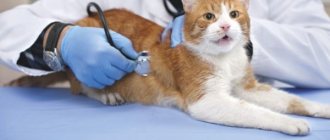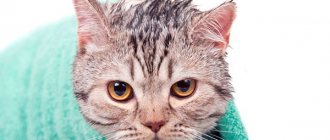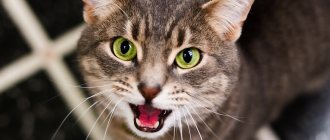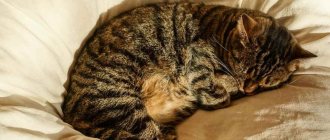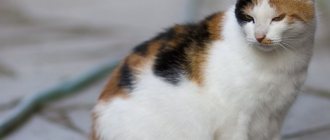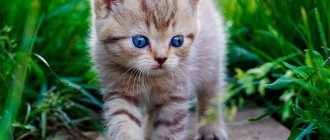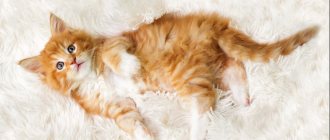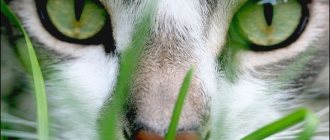6919Administration
Every owner dreams of an obedient and problem-free pet, but there are times when a cat behaves inappropriately. Someone else's soul is darkness, but a cat's soul is even more so. A phrase from the famous Russian writer Anton Pavlovich Chekhov reveals the essence of the mysterious cat nature. When it seems to us that we know absolutely everything about these animals and were able to memorize the preferences and habits of our pets, they prove to us the opposite. The cat's usual behavior can suddenly change for the worse. Then the question arises, what to do if the cat exhibits inappropriate behavior and is it worth sounding the alarm?
My cat acts like a kitten. What to do?
We received an interesting letter the other day by email.
One of our readers recently became the owner of a young cat, approximately 8-9 months old. The cat is sterilized. There is only one problem - as soon as you pick up the pet, she starts either licking her owner or lightly sucking her fingers. It should be noted that all kittens learn to lick, suck, or “knead” at a very tender age, while still in the box with their mother. Mother cat does a lot to ensure that her babies are warm, safe and comfortable all the time. She also teaches them the first basic skills.
The ability, for example, to suck is very useful for babies - they feed on mother's milk until the age of about 4-6 weeks. Sometimes a mother, wanting to please her children, feeds them with her milk a little longer - mainly to cuddle and calm them down. Indeed, small kittens, feeling the closeness of their mother and their brothers and sisters, feel completely safe and quickly calm down.
But you and I have just painted the perfect picture. Anything happens in life; very often very small, almost helpless kittens are taken away from their mother. They instinctively begin to reach out to a person, in particular, they begin to suck fingers. All this, as a rule, is accompanied by noisy purring. We know well that by purring, cats usually calm themselves down and convince themselves that “everything is fine with me.”
A couple of years ago, one of the magazines for pet lovers conducted a survey on a topic of interest to our readers. Thousands of cat owners who have such a strange, at first glance, habit were interviewed. The vast majority confirmed that at one time their pets were indeed taken from their mothers at a very young age. And with age, the habit once acquired does not go away.
We agree that the above habits do not bring much pleasure to animal owners. Many owners complain that it has become impossible to look at their hands without regret. Alas, it is very difficult to completely get rid of the habit of sucking. Is it possible to advise pets on a safe “chewing” alternative, perhaps in the form of a toy.
Have you already started to think about what to offer? Colleague Ami Shojai, smiling, recalls that her cat Seren chose ... a teddy bear in this capacity. She warns that in this case, the cat will spread its unique odors and pheromones onto the toy, and in the end it will be the cat, and not your hands, that will get priority.
Causes of deviations in the cat’s usual behavior
The reasons why an animal has changed behavior can be psychological, physiological or pathological.
Psychological reasons
Changes in the usual way of life can unbalance not only a person, but also a cat. Inappropriate behavior of a cat may be associated with a change of tray or dishes, renovation or moving to a new house, the birth of a child, and other changes. Cats are quite conservative by nature, so they experience fear and anxiety, which can manifest themselves in aggression, meowing pitifully or being overly active.
A long absence of a beloved owner or his death can cause apathy and stress in a pet. If a cat, accustomed to the constant presence of at least one family member at home, is left alone, he will show the same emotions. The appearance of another pet in the family or the arrival of a small child, who will receive the main attention of the owners, can cause jealousy and resentment in the cat. He will become aggressive or, conversely, unusually affectionate.
Physiological reasons
Seasonal changes in cat behavior are associated with the search for a sexual partner. Does your pet meow monotonously, mark furniture and corners, or does it become very loving? So, it’s time to find him a mate to relieve his excitement. Neutered cats can maintain this inappropriate behavior even a year after castration. Prolonged meowing of a pregnant cat and her agitation may indicate the beginning of labor. Thus she asks her master to help her.
© shutterstock
The character of a cat changes significantly as it grows and ages. A once unaffectionate animal may become more sensitive, and a previously affectionate and slightly annoying animal will love solitude and peace. A young kitten will get into a lot of trouble before a person raises it. Nothing inappropriate happens to the cat in such cases, it’s just that now the owner will have to get used to the new habits of his pet or build a relationship with him anew.
Pathological causes
Sometimes a cat begins to behave inappropriately due to illness. Frequent licking of fur is not always a sign of an animal's cleanliness. Please note that the cat may be trying to “lick” its pain. A pet that previously regularly visited the litter box may relieve itself anywhere due to painful urination or defecation. Your cat associates pain with the litter box, so she will avoid it.
Eating indoor plants indicates a lack of vitamins and minerals, in this way the cat tries to make up for their deficiency . If a cat that has free access to the street suddenly becomes aggressive or starts attacking its owners, show it to a specialist. Such inappropriate behavior can be caused by a deadly disease for both animals and humans, rabies.
Possible reasons
Each cat has individual character traits and methods of communicating with humans, but there are many common traits that can help you find out what exactly the animal needs. Strange behavior is always appropriate to the pet’s condition, despite the owners’ expectations. As a rule, strange behavior of a cat can be expressed in the following:
- complete apathy or excessive activity, depending on the animal’s temperament;
- the cat constantly follows the owner, caresses him, or shows aggression if the pet was previously calm;
- active damage to furniture, wallpaper and other property;
- refusal to eat;
- a usually quiet cat suddenly begins to scream when trying to relieve itself, or for no reason at all.
Who do cats attack (and how does it happen)
Before we analyze the motives for aggression in cats, let's look at whom it will most often be directed at. As a rule, cats show aggression against humans or other pets.
Why do cats attack people?
When a cat bites or scratches a person, it is important to share the aggression against the cat's owner, a family member, or a complete stranger.
If you are bitten by a cat, do not delay treating the wound with an antiseptic. If it was not a domestic purr, then you must see a doctor. We will explain what cat bites can mean in one of the following articles.
- An attack on an owner or family member may be caused by pain or redirected aggression. If you were bitten by your own cat, who has never been non-aggressive, it is very possible that you touched the sore spot (for example, while playing with your pet). It could also be some kind of benign formation (albeit often painful!), such as a tangle of hair or an undiagnosed abscess.
- An attack by a pet on a complete stranger should cause more concern. Even cats that are afraid of strangers tend to stay away from them rather than attack them. If the cat attacked, you need to understand what was the immediate cause. More often than not, the situation developed in such a way that the cat was somehow cornered and perhaps captured by a stranger against its will. This can cause panic and aggression in the cat.
You should also consider the age of the person who was attacked by the cat. Typically, cats bite or scratch small children who have been rough with their purrs (for example, during play). In other rare cases, cats attack people of a certain gender. If your cat only attacks men, it may be that she has a history of being abused or traumatized by men.
Why do cats attack other cats or pets?
Another possible victim of your pet's attack is often another family cat or pet, such as a dog.
However, attacks on small pets such as rabbits, hamsters, birds or reptiles are especially problematic for owners, as in most cases they are associated with the cat's hunting instincts . If your cat tries to attack such a pet, consider keeping them separate from each other, or even better, in separate rooms altogether.
When another cat or dog is in the position of being the victim of aggression, the first step is to understand how well both animals know each other. If they have just been “introduced” to each other, you are likely dealing with territorial aggression, which can be very serious. In this case, it is best to separate the animals, and then begin the gradual process of getting to know each other, which we will describe in detail in the next article.
If the attack was on an animal that lived peacefully with the cat for a long time, then the reason is not related to territorial aggression. Most likely this is aggression caused by stress , and possibly physical pain. Your cat may be sick or afraid of something else and take out its stress on other pets in the home.
This is interesting: How to give Omeprazole to a cat?
Signs of inadequacy
There are many signs of inadequacy, but they must be considered comprehensively. Individuals should not be labeled as inadequate if they discover only one of the following manifestations.
READ How to remove worms from a cat at home, all methods
The state of inadequacy is expressed in the following actions. And above all, it is found in unpredictable mood changes of a polar nature (a bad mood is replaced by euphoria, a good mood is replaced by a bad one), unexpected reactions to people (excessively impulsive behavior). The facial expressions and gestures of an individual in the described state do not correspond to what is happening.
An inadequate person tends to interrupt those talking, does not listen enough to their arguments and judgments, may not listen to others at all, or voice his own opinion off topic. Peremptory statements often slip through. Individuals in a state of inadequacy often express opinions that are completely inappropriate.
In appearance, there is an inappropriate selection of clothing, a style that is inappropriate for the event or setting, pretentious or provocative outfits. The appearance also undergoes changes: brightly colored curls, an unusual hairstyle, provocative makeup. Among the sons of Adam, inadequacy manifests itself in excessive piercings, “tunnels” in the ears, many tattoos, and scarring.
Inadequate people tend to take with hostility any judgments and ideas of their opponents during a conversation, regardless of their reasoning and logic. They are also characterized by increased sensitivity, inadequate reaction to friendly teasing, jokes, and harmless jabs.
Inappropriate behavior can be expressed in aggressiveness, suspicion, motor disinhibition, suicidal attempts or a tendency to self-harm, immoral acts, antisocial behavior, conflict, disruption of social interaction, categorical statements.
How to understand aggression?
Self-defense, the ability to show one’s physical strength and take advantage of it, are nothing more than survival skills that help wild and domestic animals not only form, but also give birth to offspring. Cats have coexisted with people for a very long time, but unlike dogs, they have always remained more independent.
Aggression in various forms is always present in the life of four-legged animals, with the exception of just a few breeds that are not characterized by emotionality.
It is worth understanding that artificially bred breeds do not have the full set of instincts; more precisely, some of their skills are greatly blunted. The behavior of such individuals should be considered strictly individually, contacting a zoopsychologist or a very experienced owner of cats of the same breed.
If your cat suddenly becomes aggressive, you can calm her down, but this will not solve the problem and most likely, the attack of anger will recur soon. It is important to identify the causes of aggression and take measures to eliminate them. As long as the animal has a reason to be angry, no educational measures will help.
Affect of inadequacy
The described phenomenon is a stable negative emotional state that arises as a result of failure, failure and is characterized by ignoring the fact of the fiasco or unwillingness to accept responsibility for failure. It arises as a result of conditions that give rise to the subject’s need to preserve his incorrectly formed high self-esteem and an inflated degree of aspirations.
For an individual to admit his own insolvency means to go against the existing need to preserve his own self-esteem. However, he does not want to allow this. This gives rise to an inadequate response to one’s failure, which manifests itself in the form of affective behavioral reactions.
The affect of inadequacy is a kind of defensive reaction that allows one to get out of confrontation at the cost of rejecting an adequate perception of reality: the individual maintains a high degree of aspirations and inflated self-esteem, while avoiding understanding of his own inadequacy, which became the cause of failure, avoiding incipient hesitations regarding his own skills.
The affect of inadequacy may be limited to one area of an individual’s aspirations, but it can be of a generalized nature, taking over the subject’s entire personality. Children in the described state are characterized by distrust, aggressiveness, resentment, suspicion and negativism. A child's prolonged stay in such a state leads to the development of appropriate character traits.
Affective little ones are often in persistent confrontation with teaching staff and peers. Therefore, in various ways they try to compensate for their own bad positions, try to attract sympathy for their individuality and attention, thereby striving to satisfy their own claims to good positions and justify personal self-esteem.
Such actions place such children in absolute subordination to the opinions of the environment, dependence on approval and evaluation by the team. Such subjugation can be expressed in two boundary manifestations: extreme compliance with group influence and negativistic resistance to group influence. In an adult, the presence of a persistent affect of inadequacy is often due to personality characteristics.
Specific diseases of the nervous system
Cats can be diagnosed with specific diseases of the nervous system, which are rare, resulting from serious diseases or congenital characteristics. Not all of them can be completely cured. In complex cases, lifelong monitoring and the use of supportive measures are required.
Rare disorders of the nervous system include Kay-Gaskell syndrome (dysotonomia). The provoking factors and mechanism of spread of the disease are still unknown. This pathology manifests itself in the peripheral part of the system, affecting the main vital organs of respiration, digestion, and genitourinary tract. The treatment provides little effect, as the affected parts gradually cease to function. With Kay-Hassell syndrome, the following are observed:
- alternating diarrhea and constipation;
- urinary and fecal incontinence;
- overdrying of mucous membranes;
- cessation of third eyelid functions;
- pupil dilation.
Severe infectious diseases, as well as blood poisoning, can cause hepatic encephalopathy, which impairs the functions of the organ. A complication occurs when the content of the neurotoxic element hydrogen nitrite increases. It has an effect on the brain, locally softens its tissues. As a result, neuropsychic abnormalities in behavior appear, which gradually progress. If left untreated, hepatic coma occurs.
Epilepsy can develop as a background to the underlying neuralgic disease or as an independent pathology. The disease is expressed in the form of seizures and convulsions. Epilepsy cannot be completely cured; you can only use medications to prevent frequent seizures.
A pregnant cat nursing babies may develop eclampsia. The disease is caused by a lack of calcium, which during pregnancy and lactation is consumed in increased quantities for the formation of fetuses and milk production. With eclampsia, a cat develops edema, tonic-clonic convulsions, an accelerated heart rate, increased blood pressure, impaired coordination, diarrhea, and vomiting.
Emotional inadequacy
In order to understand what emotional inadequacy means, it is necessary to find out what emotions are. This term means to excite and means the reactions of human subjects, manifested in the form of individually colored experiences, reflecting the importance for them of the influencing stimulus or the result of their own action (displeasure or pleasure).
READ Why Chicks Don't Hatch in Incubators
The term "adequacy" implies "conformity". By the adequacy of an emotional response, we mean that in a particular situation, a person’s experiences should correspond precisely to this situation. The concept under consideration is expressed by the inconsistency of the emotional response and the stimulus that caused them.
The receiving nature of emotions is often diametrically opposed to the expected reaction. For example, laughter and joy when receiving news of a serious illness in one’s own child. In other words, if a person is hit, he is in pain, he should get angry, cry, be offended, or feel other similar emotions. If emotions are inadequate, an individual may react to a blow with laughter.
Emotional inadequacy may be a sign of schizophrenia.
The most important factor in human existence is emotions. They provide a colorful life, allow you to give assessments, and have fun. Different pathologies can cause different variations in the distortion of emotional response.
With certain deviations (schizophrenia, epilepsy, a number of psychopathies), the emotional response becomes inappropriate to the conditions in which the individual finds himself. We can distinguish such variations of inadequacy of emotions as: paramimia, parathymia, emotional ambivalence, paradoxicality, echomia and automatisms.
Emotional paradox is due to the prevalence of contrastive connections. It is expressed in the desire to cause harm or trouble to individuals whom the patient himself especially loves. For example, an irresistible desire to use foul language during worship, which arises in a truly religious subject. This also includes a kind of pleasure from dental pain or pleasure from the awareness of humiliation.
All manifestations of the deviation in question can be conditionally classified into two subgroups. The occurrence of experiences that are inappropriate for a particular situation is called parathymia. For example, a person reports a joyful moment with tears. Such a change in the expression of emotions occurs when the cerebral cortex is damaged.
Otherwise, emotional paradox is manifested by a weakening of normal emotional reactions to significant events against the background of an increased response to unimportant accompanying events. Such inadequacy is due to psychesthetic proportion. At the same time, the emotional reactions of an individual are difficult to predict. For example, a person remains indifferent during a tragic event, but will cry heart-rendingly over a plucked flower.
A manifestation of emotional inadequacy is considered to be grimacing, expressed in exaggerated, exaggerated, rapidly changing facial movements. The nature of the expressiveness and emotional content of the grimaces does not correspond to the situation.
Paramimia is the discrepancy between facial reactions and the content of an individual’s emotional state. It is expressed in pathological excitation of a motor nature that occurs in the facial muscles. Some arbitrariness of facial contractions, their unidirectionality, is preserved during the external manifestation of a certain emotion.
Emotional ambivalence is found in the feeling of different emotions in relation to one object. “Incontinence” of emotions occurs in subjects suffering from paralysis or age-related dementia. Affects arise quickly and disappear almost instantly. Any little thing can plunge such patients into despair or make them happy.
Emotional automatisms are expressed in a feeling of foreignness of one’s own feelings. It seems to the individual that emotions are caused from the outside, and do not belong to him.
Echomimia is manifested by the automaticity of reproducing vivid manifestations of a partner’s emotions. People unconsciously copy gestures, intonation, and facial expressions.
Inappropriate behavior in a cat
Hello. Siamese cat, 3 years old. This is the second time. He begins to constantly lick his back, twitch nervously, wander around the apartment, periodically hiss, and there is also redness in the eyes under the eyelids, then he calms down, but does not sleep, and does not respond to his name. After the first case, we took him to the veterinarian, found out that he had severe otitis media, gave him injections (antibiotics, anti-allergens, and something else, to be honest, I don’t remember), also cleaned his ears and gave two injections in the ear area. Everything became fine, we cured the otitis media, dropped drops of pus and there was no sign of it. The cat behaved as before, two or three weeks passed and again the same symptoms. Tell me, what could it be. Thank you
Doesn't sound too much like inappropriate behavior. Apparently acute pain occurs in the back or hip joints, which is why it licks and hisses. The cat needs examination and treatment. The ears cannot do this, and a hormonal drug given as an injection can also improve this pain.
But when you touch in this area, he does not react painfully in any way. The clinic said there were many options, that it could be allergic, fright or viral, so it’s somehow not clear what to do
Andrey Andreev writes: But when you touch in this area, he does not react painfully in any way. The clinic said there were many options, that it could be allergic, fright or viral, so it’s somehow not clear what to do
You need to look further and contact during the period of exacerbation.
Currently viewing this topic 1 guest.
Types, symptoms and characteristics of nervous conditions
Experts distinguish 2 large groups of obsessive-compulsive pathologies in cats:
- nervous system (NS) disorders;
- brain dysfunction.
Some neurological diseases in cats are genetic, while others develop under the influence of trauma, toxic substances, and the environment. Regardless of the reasons for the appearance, the general symptoms are not much different from the “wrong” behavior of a harmful animal. This misleads the owner. Therefore, the cat is shown to the doctor late, which leads to collapse and even death of the pet. There are a number of diseases and other factors that can cause a cat to become hysterical, upset, and constantly nervous.
Epilepsy
With such an attack, pets experience convulsions.
There is a disruption in the functioning of nerve endings in the brain at the genetic level or under the influence of trauma, difficult childbirth, or toxins. It manifests itself with varying intensity, and is treated by constant use of anticonvulsant medications. Symptoms of an attack:
- tendency to stare motionlessly at one point;
- seizures and convulsions;
- foam at mouth;
- sudden collapse.
Diabetic neuropathy
Appears against the background of diabetes and is characterized by chronic degeneration of nerves due to constantly elevated blood sugar. Requires constant nutritional monitoring and insulin support. Characterized by the following symptoms:
- weakness in hind legs;
- difficulties in movement;
- weak support on the feet.
Hyperthyroidism
With endocrine disruption, the animal becomes excessively drowsy.
This type of disease of an endocrine nature is characterized by increased production of thyroid hormones, often due to nodular growth of the organ in a cat. Treated with corticosteroids and potassium supplements. Neurology manifests itself in this way:
- drowsiness, lethargy of the animal;
- muscle tremors;
- negative reaction to touch due to muscle pain;
- permanently bent neck.
Myasthenia gravis
Asthenic bulbar palsy develops both as a secondary pathology and as a genetically inherited one. Manifested by muscle weakness due to poor nerve conduction. The cat becomes lethargic and inactive. This increases the risk of developing pneumonia. Treatment requires medication, most often with AChE (acetylcholinesterase) inhibitors, Prednisolone, and pyridostigmine bromide. In extreme cases, surgery is performed.
Neurosis in a cat
If a sensitive cat is under the influence of a strong stress factor for a long time, then the development of deviations in the functioning of the nervous system will be inevitable. A neurotic cat may suddenly attack the owner in a fit of aggression or fall into a state of spontaneous hyperesthesia, that is, it will shy away and hiss at any attempt to touch. It is also possible to detect a violation based on the following signs:
You can suspect such a disease when your pet licks itself for hours.
- fear, even to the point of horror, of familiar objects, other pets and people;
- mindless wandering;
- lack of response to shouts and sharp sounds;
- prolonged, up to several hours, licking of fur;
- a sharp change in mood from an apathetic to a hyperactive state;
- inadequate response to touch;
- constantly loud and mournful meowing;
- tail racing;
- eating inedible things;
- hunting for an invisible enemy;
- long sitting in a dark corner with refusal of food and toilet.
Other states
Nervous breakdowns, tics, convulsions, neurosis - these may be signs of severe poisoning, intoxication, or organic brain damage. There are even cases when schizophrenia is diagnosed in cats. This pathology occurs only artificially, that is, under the influence of narcotic substances eaten by accident. Scientists came to this conclusion.
The animal experiences severe stress even from riding in transport.
Only an experienced veterinary neurologist can determine the exact cause and make a diagnosis. Stress caused by exposure to negative environmental factors, hormonal changes during seasonal periods of “bangling”, panic when driving in public or private transport, lead to the fact that the nervous system cannot stand it, as a result the animal cannot control its actions. Manifestations of such conditions:
- loud meowing;
- excessive salivation;
- uncontrolled urination;
- throwing in a carrier;
- lack of reaction to the nickname.

